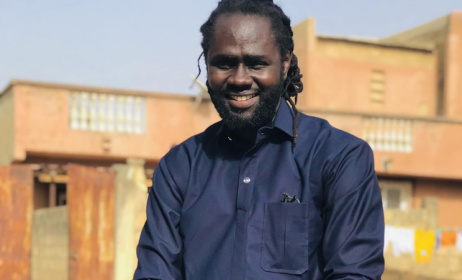Remembering Ras Kimono
My relationship with reggae was inherited from my father, whose collection was guarded even in his absence by warnings decreed in clear terms.
 Ras Kimono played reggae music until his death. Photo: Immanuel James
Ras Kimono played reggae music until his death. Photo: Immanuel James
One evening during our stay in Woji, Port Harcourt, he returned from work with a new cassette, the words 'Ras Kimono' on it. Encased in virgin plastic, it found rest on that brown centre table, awaiting an official launch by father. Instead, the patriarch slept sitting on a sofa, and the night swallowed my expectation for new music. As soon as he left for work the next morning, I carefully opened the plastic and helped Kimono into the stereo.
“Ayaga-yaga-yaga-yoo!” he yelled, to my exuberant bounce. On wanting to rewind the track when its first play ended, I looked up and saw the patriarch standing by the door, his anger numbed by the silent joy of a son following fatherly example.
That induction led me into the entire reggae philosophy that is Ras Kimono. Before his death at 60, Kimono’s last undertakings, in hindsight, seem executed with an urgency suggestive of premonition. His interview with me, perhaps his last, was exhaustive and, in a way, valedictory.
“I’m the last man standing...And we just have to make our mark in life”, he said about why he was still busy with music projects. His last couple of months had seen a lot of shows, including an Evening with Ras Kimono at Freedom Park in Lagos. A month earlier, his last birthday carried a tinge of climax.
There was also a fairly new album, Senseless Killings, denouncing literal and symbolic killings by Nigerian sectarian forces. It received depressing airplay. His vision of the conscious mandate of music and its agency for political intervention was unilateral—unshared by the media and the people on whose behalf he worked his art.
Today’s music instead speaks “on behalf of sex, money and designer brands—and the people consent”. Sometimes Kimono shared the album by hand for free. There was a man compelled by evangelical zeal rather than money, a man who loved the people and lived with them, consistent in message and ideals.
Ras Kimono contributed to a wave of Rastafarianism that dominated the airwaves of my childhood in the 1980s. His songs were regular intoxicants to uncles old enough to be free. They frolicked like lambs and jumped for dance. A continental sensation, Kimono was stateless in principle, contemptuous of the colonial boundaries that tore Africa into geographical shreds. He was simply a black man rooted in Nigeria, he often said, and his message targeted all Babylonians—all systems of black oppression. “Shit-Stem,” he called them. Black politicians, colonialists, the military. Kimono will be remembered for uniting the hungry and the oppressed with music, stirring in them a passion that set Babylon on fire.
He will also be remembered for his discipline, humility and cheer. He led a vegetarian lifestyle and neither smoked nor drank. He answered calls from unknown numbers and called back if he missed them, sometimes apologetic. He lived an ascetic life. A genuine hospitality drew people to him and his love was large enough to go round. His modesty disagreed with a world that has grown too messy with rot.
He left behind a family invested in reggae music. He married his manager and influenced a daughter who today carries the torch with a career in reggae. Oge Kimono performed with her father at the Freedom Park concert in what showed a family’s true devotion to the art.
“She will do better than me,” he promised during the interview, dismissing my lament of young people's apathy for the genre. Nigerian pop borrows reggae to blend new forms that keep the past alive, he said. A triumphant smile settled on his face in an apparent sense of congratulation: the labour had not been in vain, and would yield more if only the broadcast media could improve on reggae airplay.
While his Under Pressure album brought him fame in the 1990s, the song ‘Rastafarian’ declared his mission in the world. He’s a Rastafarian, he sings, and he’s not crazy; he’s here to preach the word of Jaja, the word of freedom, and he did just that. Slow-paced and soulful, the track recalls in hindsight the lost glory of reggae.
As he performed on stage at Freedom Park during an Evening with Ras Kimono, the crowd erupted. It was a modest pack of the older, middle-class generation. They were among the poor for whom he spoke in his heyday. They had come to give back, to support a man whose art helped forge their conscience for nation-building.
Ras Kimono performed with muted energy, but the people were with him singing along, lighting up the place in flames of memory. It was a gathering of people grateful for their luck, putting their voices up for a man who is the face of a vibrant past.



























Commentaires
s'identifier or register to post comments